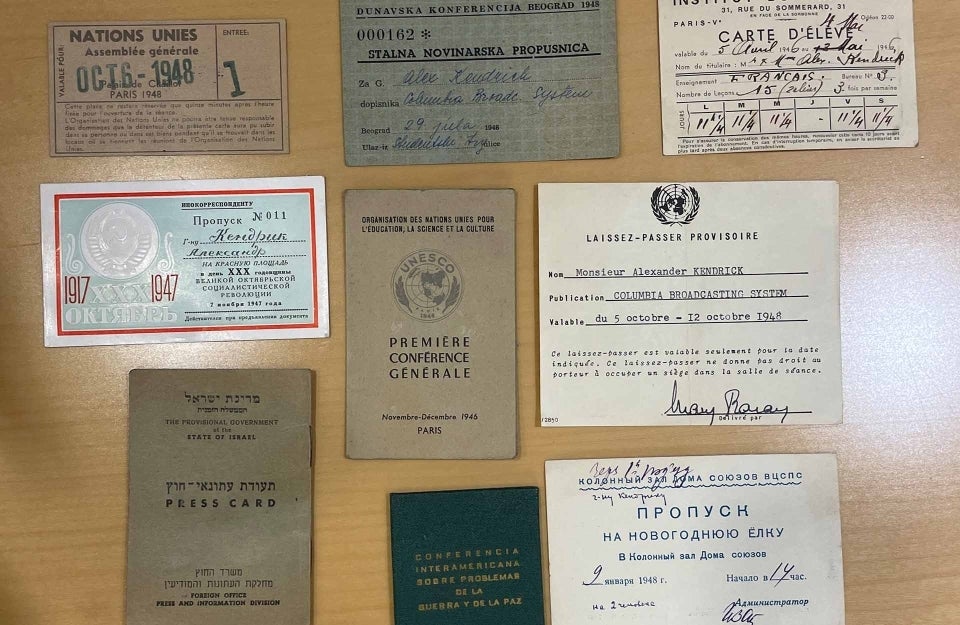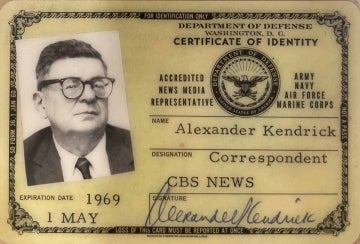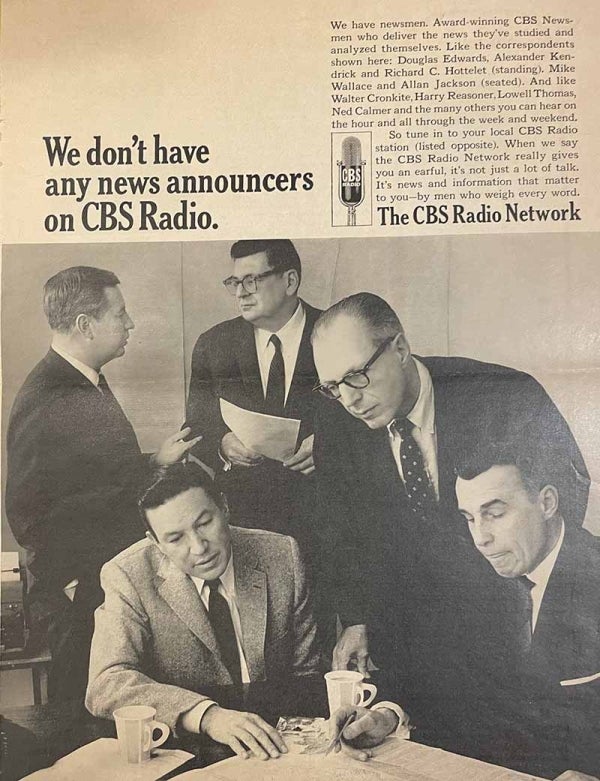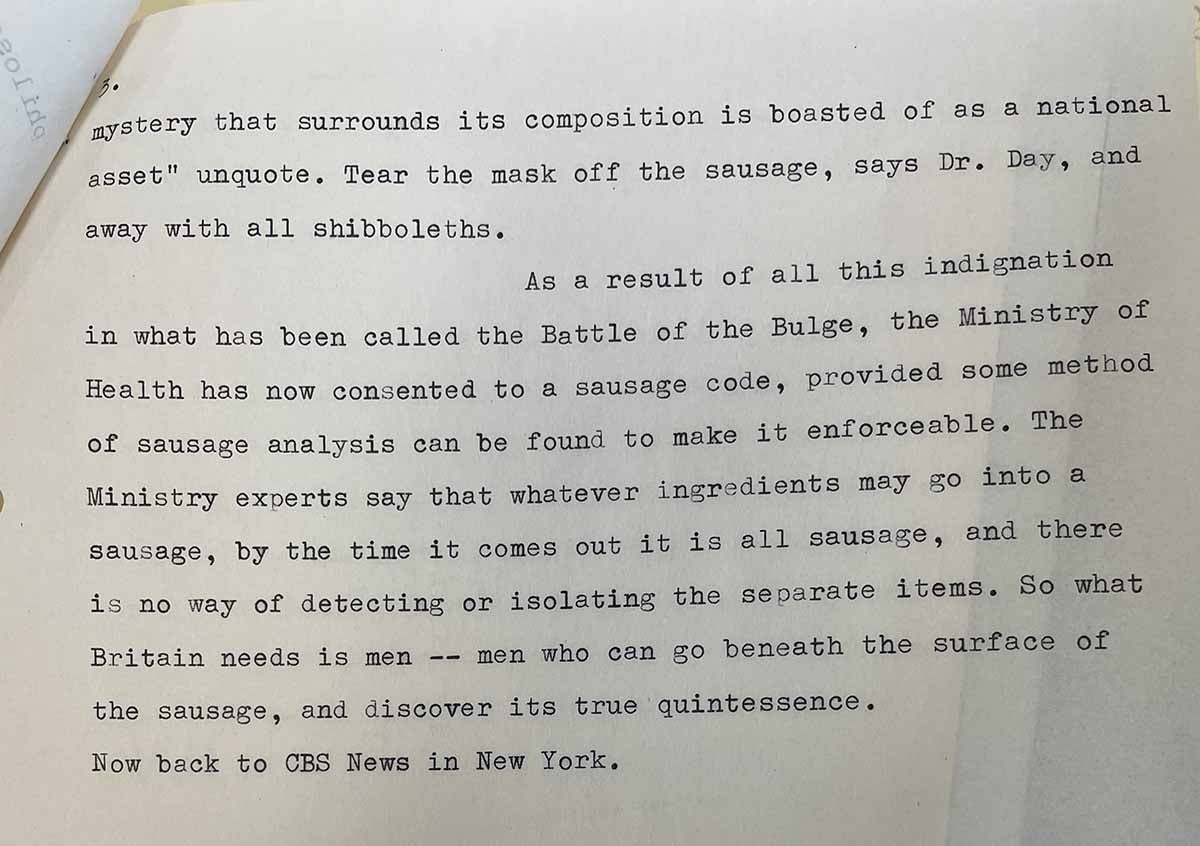Personal Papers of World War II-era Journalist Alexander Kendrick Now Available in the Annenberg Library Archives
Kendrick was notably a CBS Radio and TV correspondent who became one of “Murrow’s Boys.”

Identity cards issued by various governments for Alexander Kendrick's time as a foreign correspondent in the 1940s, now held by the library collection (Photo Credit: Samantha Dodd)
From the onset of the Second World War through the events of the Cold War, journalist, author, and foreign correspondent Alexander Kendrick documented and reported numerous conflicts, escalations, and deescalations of a world at war.

After a lengthy career in journalism, Kendrick retired in 1975. His family donated his personal papers after he died in 1991 to the Annenberg School for Communication Library Archives, which has a collection devoted to the history of the field of journalism. The collection is comprised of television and radio scripts, handwritten notes, personal and professional correspondence, ephemera, records, and photographs from his days as a foreign correspondent, with The Ledger and The Philadelphia Inquirer, to his time with Columbia Broadcasting System (CBS).
From South Philly to Soviet Russia
Born on July 6, 1910, in Philadelphia, Pennsylvania, Kendrick grew up in South Philly where he graduated from Central High School around 1930. His career in journalism began with The Public Ledger in Philadelphia.

When the paper folded in 1942, Kendrick moved on to The Philadelphia Inquirer, which sent him overseas at the beginning of World War II, to cover the Murmansk Run, an Allied convoy route through which Allies sailed to the Soviet ports of Murmansk and Archangel carrying supplies.
Kendrick’s career changed direction after the war when he encountered Edward R. Murrow on a trip to Rome. The encounter led Kendrick to join CBS News as a radio and television correspondent, becoming a second-generation “Murrow Boy.”
The Murrow Boys, or Murrow's Boys, were CBS radio broadcast journalists recruited by Edward R. Murrow during his time at the network. The "Boys" were his closest professional and personal associates. Kendrick went on to serve as the CBS Bureau Chief in London until he was succeeded by Dan Rather in 1965.
Journalism, according to an essay by Kendrick, “is not just an early shape of history. It functions by different rules, not seeking to understand and explain so much as to stir up, confront, and challenge. The human factor plays a major role in the reporting of news, on both sides of the pencil or camera. Personalities, rather than forces, often define problems.”
A Global Career
As a foreign correspondent, Kendrick reported on and from numerous cities including Moscow, Vienna, and London. He covered postwar politics and events in the Middle East, Russia, Central and Eastern Europe, and Vietnam. He was the only American reporter to cover the trial of Robert Voegler, a case that dealt with an American businessman accused by the communist government of espionage and sabotage by Communists in Budapest.
However, not all of Kendrick’s stories centered on intense global events. A more amusing story Kendrick reported on World Tonight took place on October 17, 1958: After a truck knocked over a pole in London causing a gas leak, a quick-thinking butcher plugged the leak with three sausages. A public debate ensued about the definition of “sausage.”
“The saga of sausage had another thrilling chapter added to it,” opens Kendricks script. Later in the script, a line is crossed out, and presumably never made it to air: “The odor of sizzling sausage hangs over the United Kingdom, in such a thick cloud that it is believed partly responsible for the bad weather.”

Return to the U.S.
After leaving London and returning to Washington, Kendrick focused his time on his writing. In 1969, he published Prime Time: The Life of Edward R. Murrow, a biography chronicling the career and experiences of Murrow from his childhood to his confrontation with Senator Joseph McCarthy's red scare during the 1950s.
His second work, The Wound Within: America in the Vietnam Years, 1945-1974, chronicles the American role in the Vietnam War abroad as well as happenings on the home front from the civil rights movement, draft resistance, and collegiate protests of "the system."
In 1975 Kendrick retired from CBS and returned to live in Philadelphia. He died on May 17, 1991.
Viewing the Collection
Kendrick is best known for his reporting of international events in World War II and postwar years. His papers provide insight into global communication, journalism, and reporting during times of war, and document his perspective of the political landscape. Collections in the Annenberg School for Communication Library Archives, which encompass research materials pertinent to the interdisciplinary field of Communication and its history, are open for research to anyone, by appointment during our normal operating hours. To make an appointment, please contact the lead archivist Samantha Dodd at samantha.dodd@asc.upenn.edu.
A version of this story originally ran on the Penn Libraries blog, Unique at Penn.



